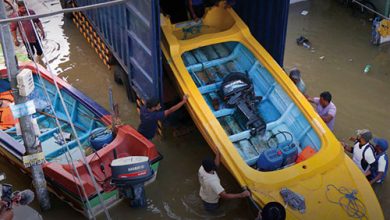TRANSNATIONAL CORRUPTION


POTUS IS FIGHTING GRAFT
President Joe Biden charges ahead on his campaign promise to combat global corruption – Rajika Jayatilake reports
As the world struggles to recover from the COVID-19 pandemic, many countries are realising the sheer impossibility of this effort with corruption undermining every step taken in the path to economic recovery.
UN Secretary-General António Guterres recently noted at an anticorruption conference: “Greed over need harms us all.” He advocated taking corruption head-on as “an important step towards inclusive, sustainable development.”
COVID-19 also provides opportunities for corruption to thrive when the demand for goods and services is far in excess of supply. Humanitarian aid, police corruption and healthcare were prime areas where graft flourished during the pandemic, according to Transparency International (TI).
Furthermore, as earlier disasters showed, feeble welfare situations have had a strong adverse impact on the poorest segments of society while their recovery is far slower than that of affluent communities.
Consequently, according to World Bank projections, extreme poverty was estimated to have increased globally in 2020 – for the first time in 20 years. This would have thrust between 88 and 115 million more people into extreme poverty in 2021, with the globally disempowered and marginalised rising to an estimated 150 million at the end of last year.
To the world’s poorest people therefore, every day brings a fresh and urgent crisis to obtain basic food, shelter and security, which has been made even harder by endemic corruption. As TI asserts, for any post-pandemic recovery to be inclusive and meaningful, there needs to be real commitment to fight corruption and ensure greater transparency in government establishments.
Emphasising this point, the UN says that the annual global cost of corruption is at least US$ 2.6 trillion – or some five percent of global GDP. Furthermore, the World Bank estimates that businesses and individuals pay more than a trillion dollars in bribes annually.
The Executive Director of the UN Office on Drugs and Crime (UNODC) Ghada Waly observes: “Corruption undermines development, security and the rights of everyone. It erodes public trust in systems and institutions.”
As she sees it, fighting corruption needs to start at the highest echelons of a nation’s leadership with “resolute political will” – and then the necessary resources need to be mobilised to activate state and corporate sectors, strengthen women and empower youth. She adds: “Each and every one of us has a role to play.”
In developing countries however, the situation is abysmal with income losses amounting to US$ 1.26 trillion annually through corruption, bribery, theft, tax evasion and other illicit financial flows.
This wealth can raise 1.4 billion people above the poverty threshold – and keep them out of poverty for at least six years. Corrupt systems boost the ultra-wealthy, leaving everyone else in the country relatively – if not absolutely – poor.
There is no doubt that corruption is endemic in global societies. But what is not equally apparent in most countries is the will among the leadership of countries to fight corruption.
For instance, having based his presidential campaign on an anticorruption theme, and upon winning the presidency, President Joe Biden launched his promised war on corruption in America on 3 June 2021 as a fundamental national security interest for America.
He stated in his National Security Study Memorandum-1(NSSM-1) that “corruption threatens the United States’ national security, economic equity, global antipoverty and development efforts, and democracy itself.”
Correspondingly, Biden instructed his national security team to focus on an anticorruption strategy based on five mutually reinforcing pillars of work.
These include updating, coordinating and funding the government’s anticorruption programme; halting illicit financing; seeking accountability from corrupt operators; protecting and strengthening the multilateral anticorruption plan; and seeking stronger diplomatic engagement while using anticorruption requirements when offering foreign aid to developing countries.
While reviewing the existing situation, Biden’s White House discovered the underutilisation of authority given to executive agencies and grasped the unexpected opportunity. Federal agencies were instructed touse their powers – such as the Treasury Department formulating title insurance reporting guidelines so that stolen money couldn’t be hidden in anonymous real estate holdings or shell companies – to fight corrupt practices.
Moreover, the United States Agency for International Development (USAID) has a global challenge in place to fight corruption across the world and a defence fund to help discredited international journalists.
Further strengthening POTUS’ commitment to fight corruption, the White House recently released its first ever United States Strategy on Countering Corruption, which seeks to “identify and rectify persistent gaps in the fight against corruption.”
It also focusses on “the transnational dimensions” of corruption while “recognising the ways in which corrupt actors have used the US financial system and other rule of law-based systems to launder their ill-gotten gains.”
America intends to promote the private sector across the world as ‘critical actors’ in its global strategy to bridle international kleptocrats from hiding stolen wealth behind a facade of anonymity.
And Biden asserts: “Fighting corruption is not just good governance – it is selfdefence, it’s patriotism.”
Fighting corruption is not just good governance – it is self-defence, it’s patriotism
President Joe Biden





